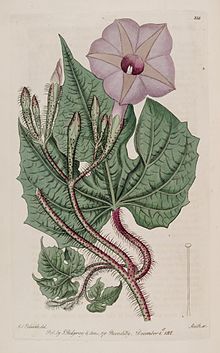| Ipomoea setosa | |
|---|---|

| |
| Scientific classification | |
| Kingdom: | Plantae |
| Clade: | Tracheophytes |
| Clade: | Angiosperms |
| Clade: | Eudicots |
| Clade: | Asterids |
| Order: | Solanales |
| Family: | Convolvulaceae |
| Genus: | Ipomoea |
| Species: | I. setosa |
| Binomial name | |
| Ipomoea setosa Ker Gawl. | |
| Subspecies | |
| |
| Synonyms | |
Ipomoea setosa, the Brazilian morning-glory, is a species of flowering plant in the family Convolvulaceae. Its range is larger than its common name suggests and is native to Argentina, Belize, Bolivia, Brazil South, Brazil, Costa Rica, Ecuador, El Salvador, Guatemala, Honduras, Mexico, Nicaragua, Panama, Peru, and Venezuela, and has been introduced to China, and the United States.
Cultivation and description
Like many species of Ipomoea, this plant is cultivated for its flower blooms. It is a climbing herbaceous tree that grows in a seasonally dry tropical biome, and has four accepted infraspecific named variations. The seeds of this plant have an oval shape and have filamentous margins.
Chemistry
As with many species of Ipomoea, I. setosa reportedly has alkaloids that make consuming the plant unpleasant for herbivores. It is not grown for consumption but for aesthetics.
References
- ^ "Ipomoea setosa". Plants of the World Online. Royal Botanic Gardens, Kew. Retrieved 21 May 2024.
- Citizen science observations for Ipomoea setosa at iNaturalist
| Taxon identifiers | |
|---|---|
| Ipomoea setosa |
|
This Solanales article is a stub. You can help Misplaced Pages by expanding it. |